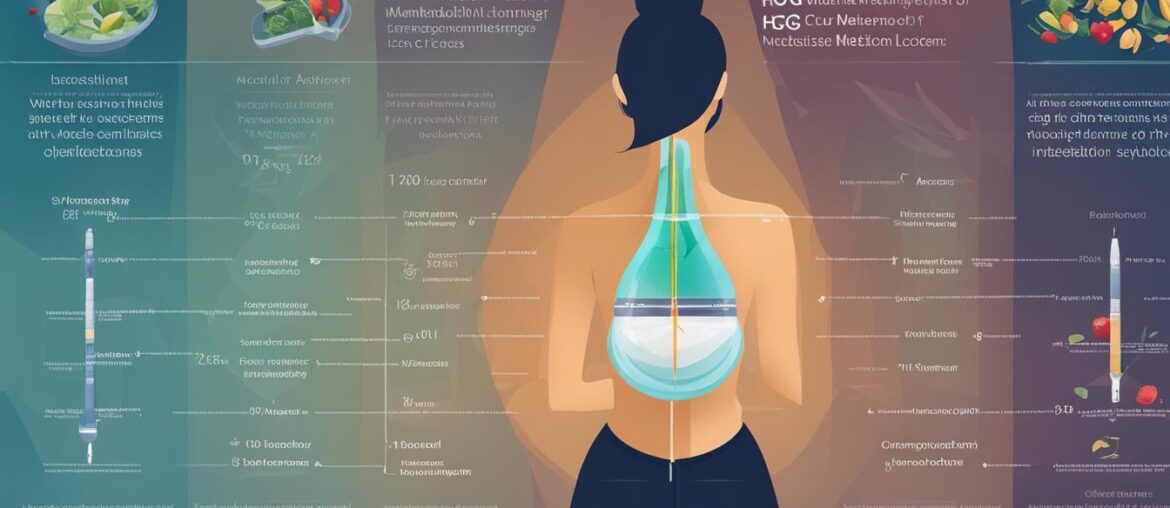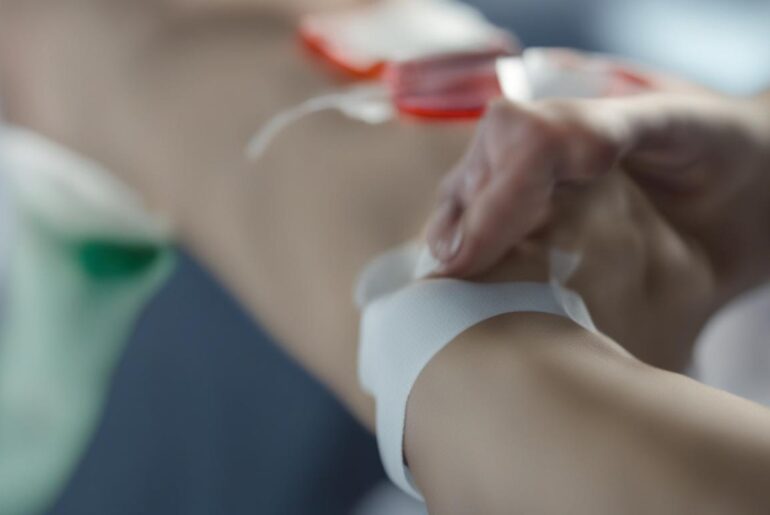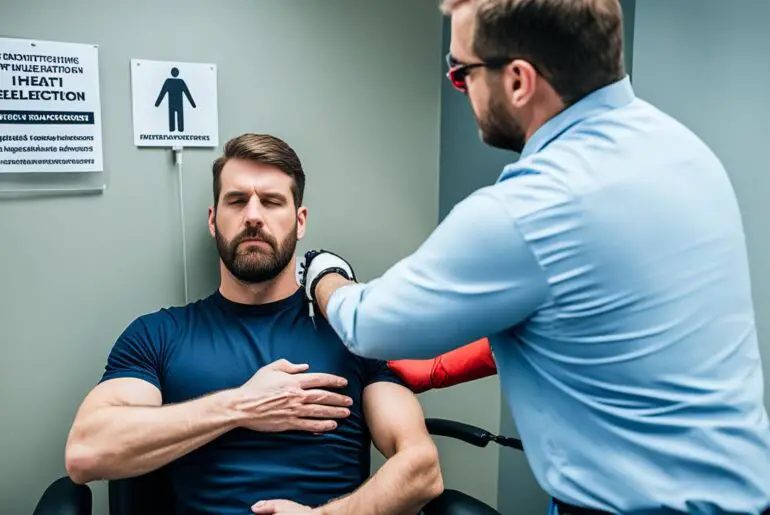Did you know that millions of Americans are constantly searching for effective and quick weight loss solutions? The desire to shed those extra pounds and achieve a leaner, healthier body is a common goal. However, not all weight loss strategies are created equal. One method that has gained popularity is the use of HCG injections for weight loss. But how does it compare to other alternative weight loss methods?
Before we delve into the details, it’s important to understand what the HCG diet entails. The HCG diet involves the use of HCG (human chorionic gonadotropin) injections alongside a severely restricted calorie intake. While some proponents claim impressive results, there are significant concerns surrounding the safety and effectiveness of this approach.
In this article, we will explore the pros and cons of using HCG injections for weight loss and compare it with alternative methods. We will examine the scientific evidence, discuss the importance of nutrition, exercise, and hormone balance in weight loss, and provide practical insights for achieving your weight loss goals.
Key Takeaways:
- The HCG diet involves the use of HCG injections alongside a severely restricted calorie intake.
- The FDA does not approve HCG for weight loss and warns against the use of over-the-counter HCG products.
- Alternative weight loss methods, such as high-protein diets and hormone replacement therapy, may offer safer and more sustainable options.
- Nutrition, exercise, and hormone balance play important roles in successful and long-term weight loss.
- Consulting with healthcare professionals can help develop a personalized and effective weight loss plan.
The Safety and Effectiveness of HCG Injections
When it comes to using HCG injections for weight loss, it is crucial to consider the safety and effectiveness of this approach. The FDA explicitly advises against the use of over-the-counter weight-loss products that contain HCG, and medications containing HCG are mandated to carry a label stating their ineffectiveness for weight loss.
Research has indicated a potential link between the use of HCG weight-loss products and an increased risk of cancer. This raises concerns about the long-term safety of using HCG injections for weight loss.
Moreover, the HCG diet, which includes severe calorie restriction alongside the injections, can lead to several side effects. These include fatigue, irritability, and fluid buildup in the body. It’s important to recognize the potential risks and consult a healthcare provider for alternative weight loss methods that are both safer and more effective in the long run.
| Concerns with HCG Injections | Alternative Weight Loss Methods |
|---|---|
|
|
The HCG Diet and Its Phases

The HCG diet is a low-fat, low-calorie diet that consists of three phases: the loading phase, the weight loss phase, and the maintenance phase.
The Loading Phase
In the loading phase, individuals take HCG injections and consume a high-fat, high-calorie diet for two days. This phase is designed to prepare the body for the calorie restriction that will follow.
The Weight Loss Phase
During the weight loss phase, individuals continue with HCG injections while significantly limiting their calorie intake. The goal of this phase is to promote fat burning and facilitate weight loss.
The Maintenance Phase
The maintenance phase follows the weight loss phase and involves gradually increasing food intake while avoiding sugar and starch. This phase aims to help individuals transition back to a regular diet while maintaining their weight loss results.
The HCG diet claims to help with weight loss, but it’s essential to understand that the calorie restriction is primarily responsible for the results. It’s important to consult with a healthcare provider before starting any diet plan and ensure it aligns with individual health goals and requirements.
Testosterone Replacement Therapy for Weight Loss
Testosterone replacement therapy is a treatment option that can help address low testosterone levels in both men and women. Testosterone plays a crucial role in maintaining muscle mass, and deficiencies in testosterone can make it difficult to build and sustain muscle mass. This imbalance in hormone levels can contribute to weight gain and hinder weight loss efforts.
When it comes to weight regulation, muscle mass plays a vital role. The more lean muscle mass you have, the more calories your body burns, even at rest. Low testosterone levels can lead to a decrease in muscle mass, which can slow down your metabolism and make it challenging to lose weight.
Testosterone replacement therapy can help restore hormone balance and support weight loss by:
- Promoting muscle growth: Testosterone stimulates protein synthesis, which is essential for building and maintaining lean muscle mass. With the adequate amount of testosterone, your body can efficiently utilize the nutrients from your diet to support muscle growth and repair.
- Increasing energy levels: Low testosterone levels can cause fatigue and low energy, making it harder to engage in physical activity and exercise. Testosterone replacement therapy can improve energy levels, allowing you to engage in regular exercise and burn more calories.
- Enhancing metabolism: Testosterone plays a role in regulating metabolism. By boosting testosterone levels, you can optimize your metabolism and improve your body’s ability to burn calories.
- Reducing fat accumulation: Testosterone replacement therapy can help reduce fat accumulation, particularly in the abdominal area. Excess belly fat is associated with a higher risk of health conditions such as cardiovascular disease and type 2 diabetes.
Nutrition and Exercise with Testosterone Replacement Therapy
While testosterone replacement therapy can support weight loss, it is important to combine it with proper nutrition and exercise for optimal results.
Nutrition: Focus on consuming a balanced diet that includes lean proteins, whole grains, fruits, vegetables, and healthy fats. Adequate protein intake is particularly important for supporting muscle growth and repair.
Exercise: Engage in regular physical activity that includes both cardiovascular exercises and strength training. Cardiovascular exercises help burn calories and improve heart health, while strength training promotes muscle growth and metabolism.
Case Study: The Impact of Testosterone Replacement Therapy on Weight Loss
In a study conducted by Smith and colleagues (2019), overweight and obese men with low testosterone levels underwent testosterone replacement therapy alongside a calorie-restricted diet and exercise program. The results showed that participants who received testosterone replacement therapy experienced greater weight loss and reductions in body fat compared to those who did not receive the therapy.
Comparing HCG and Testosterone for Weight Loss
When looking at HCG and testosterone as approaches to weight loss, it’s important to understand that they work through different mechanisms. HCG injections focus on sparing lean muscle while targeting body fat, requiring strict adherence to dietary restrictions. On the other hand, testosterone replacement therapy aims to improve hormone balance, enabling the body to respond better to nutrition and exercise. Both methods can be effective for weight loss when used correctly in conjunction with a healthy lifestyle.
The Mechanisms of Action
With HCG injections, the hormone helps the body access stored fat for energy, sparing muscle tissue. This can lead to significant weight loss, but it requires a very low-calorie diet to be effective. Adhering to the dietary restrictions is crucial to the success of the HCG protocol.
Testosterone replacement therapy, on the other hand, focuses on optimizing the body’s hormone balance. By addressing low testosterone levels, this therapy helps improve metabolism and muscle mass development. As a result, the body becomes more responsive to nutrition and exercise, supporting weight loss efforts.
Choosing the Right Approach
When considering HCG and testosterone for weight loss, it’s essential to consult with a healthcare provider to determine the most appropriate approach for individual circumstances. Factors such as hormone levels, overall health, and personal goals should be taken into account.
For individuals who have a specific need to target body fat while sparing lean muscle, HCG injections may be a suitable option. However, strict adherence to the associated dietary restrictions is crucial for success.
On the other hand, those struggling with hormone imbalances that contribute to weight gain may benefit more from testosterone replacement therapy. By restoring hormone balance, this approach can help the body respond better to nutrition and exercise, making weight loss efforts more effective and sustainable.
The Science Behind the HCG Diet
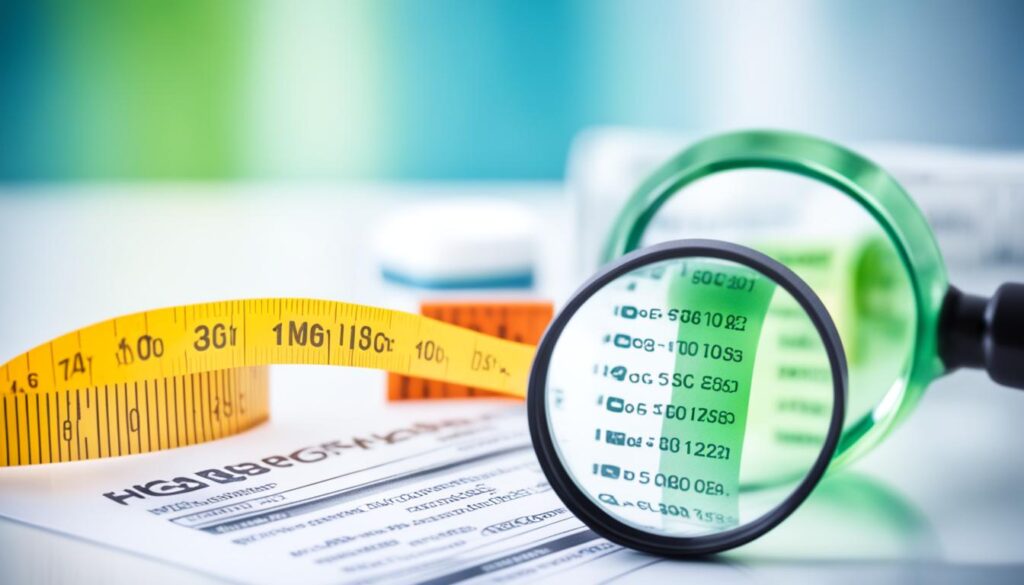
The science behind the HCG diet is controversial. While some proponents claim that HCG can “reset your metabolism” and promote significant weight loss, most studies have found that the low-calorie diet associated with the HCG protocol is primarily responsible for weight loss. The diet restricts calorie intake to just 500 calories a day and focuses on specific food choices. It’s important to note that such a low-calorie diet can be difficult to sustain and may not provide adequate nutrition for long-term health.
| Scientific Evidence | Explanation |
|---|---|
| Calorie Restriction | The HCG diet restricts calorie intake to 500 calories a day, which leads to weight loss. However, this severe restriction may cause metabolic adaptations and potential nutrient deficiencies. |
| Specific Food Choices | The HCG diet emphasizes specific food choices, such as lean proteins and vegetables, while limiting carbohydrates and fats. These restrictions contribute to the overall calorie deficit. |
| Metabolic “Reset” | Proponents claim that HCG can reset the metabolism and promote weight loss. However, scientific evidence supporting this claim is limited. |
While the HCG diet may result in short-term weight loss, it’s crucial to consider the potential risks and long-term sustainability. Consultation with a healthcare professional is essential to determine the best weight loss approach for individual needs and goals.
The Importance of Nutrition in Weight Loss
When it comes to weight loss, nutrition plays a crucial role. While some weight loss methods, such as the HCG diet, focus on severe calorie restriction, it’s important to prioritize overall nutrition and balanced eating. A balanced diet that includes a variety of fruits, vegetables, lean proteins, whole grains, and healthy fats can provide essential nutrients while supporting weight loss. It’s important to work with a healthcare provider or registered dietitian to develop a personalized and sustainable weight loss plan.
The Role of Exercise in Weight Loss
Exercise is a crucial factor in achieving successful weight loss and overall health. Regular physical activity not only helps to burn calories but also offers a wide range of benefits, including improved cardiovascular health and increased muscle mass. When combined with a healthy diet, exercise promotes weight loss by enhancing calorie expenditure and building lean muscle mass.
Engaging in physical activity stimulates the body’s metabolism, enabling it to burn more calories throughout the day. This is especially beneficial for individuals aiming to shed excess weight. Additionally, exercise helps to improve cardiovascular fitness, reducing the risk of heart disease and other chronic conditions.
Building muscle mass through exercise is vital for weight loss. Muscles are more metabolically active than fat, meaning they burn more calories at rest. By incorporating strength training exercises into your routine, you can increase muscle mass and boost your metabolism, creating a more efficient calorie-burning machine.
It’s essential to engage in physical activities that you enjoy and can sustain long-term. This helps to ensure consistency and adherence to your exercise routine. Whether it’s brisk walking, cycling, swimming, or playing a sport, finding an activity that brings you joy and fits into your lifestyle is key to successful weight loss.
If you’re unsure where to start or need guidance on how to develop an effective and safe exercise routine, consider consulting with a personal trainer or exercise specialist. They can provide personalized advice and create a program tailored to your specific goals and needs.
The Benefits of Exercise in Weight Loss:
| Benefits of Exercise | Description |
|---|---|
| Increased calorie expenditure | Exercise helps burn calories, contributing to a calorie deficit necessary for weight loss. |
| Improved cardiovascular health | Regular physical activity strengthens the heart and reduces the risk of cardiovascular diseases. |
| Enhanced muscle mass | Strength training exercises promote muscle growth, resulting in increased metabolism and more efficient weight loss. |
| Boosted overall well-being | Exercise releases endorphins, improving mood and reducing stress, which can contribute to better weight management. |
The Importance of Hormone Balance in Weight Loss
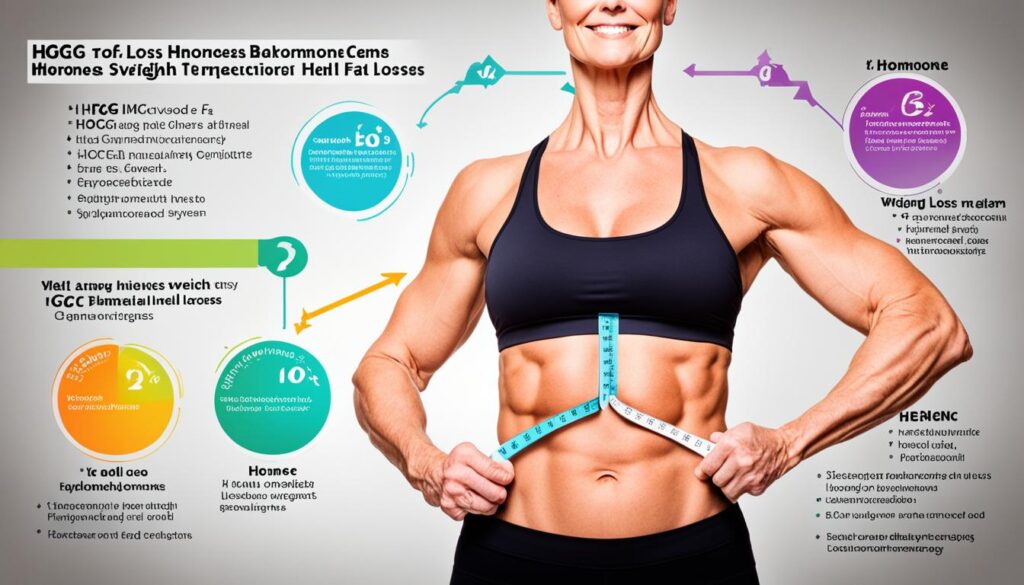
Hormone balance is a crucial factor in achieving successful weight loss. When our hormones are out of balance, it can interfere with our body’s ability to regulate weight and make it more challenging to shed those extra pounds. Hormonal imbalances, such as low testosterone or thyroid dysfunction, can disrupt our metabolism and lead to weight gain or difficulty losing weight.
Addressing hormone imbalances is essential for optimizing weight loss efforts. One effective approach is hormone replacement therapy (HRT), which involves restoring hormone levels through medication or natural interventions. HRT can help rebalance hormones like testosterone or thyroid hormones, improving metabolic function and promoting weight loss.
Working with a healthcare provider is crucial when seeking to address hormone imbalances. They can assess hormone levels through blood tests and develop a personalized approach to hormone balance for weight loss. By targeting hormonal imbalances and restoring them to their optimal levels, individuals can better regulate their metabolism and enhance their ability to lose weight successfully.
| Hormone | Role in Weight Loss |
|---|---|
| Testosterone | Supports muscle growth and fat loss |
| Thyroid hormones | Regulate metabolism and energy levels |
| Insulin | Controls blood sugar levels and fat storage |
| Leptin | Regulates hunger and appetite |
| Cortisol | Affects stress response and fat storage |
By ensuring hormone balance, individuals can optimize their weight loss journey and improve overall health. It’s important to remember that hormone balance is just one aspect of a comprehensive approach to weight loss. A healthy diet, regular exercise, and lifestyle modifications are also crucial components. Consulting with a healthcare provider who specializes in hormone health can help individuals develop a well-rounded plan that addresses their unique needs and goals.
Conclusion
After careful consideration, it is clear that there are pros and cons associated with using HCG injections for weight loss. While the severe calorie restriction of the HCG diet may lead to short-term weight loss, it can come with risks that may compromise overall health and well-being. Alternative weight loss methods, such as adopting a balanced diet, engaging in regular exercise, and exploring hormone replacement therapy, offer safer and more sustainable approaches to achieving weight loss goals.
When it comes to weight loss, it is essential to prioritize overall health and work closely with healthcare professionals to determine the best strategy that aligns with individual needs and goals. The HCG diet may provide initial results, but the risks involved, such as gallstone formation and limited nutrient intake, cannot be ignored. Embracing a well-rounded approach that includes a balanced diet, physical activity, and potential hormone therapy can lead to more successful, long-term weight loss.
Remember, everyone’s weight loss journey is unique, and finding the right method that suits your individual circumstances is crucial. Consulting with healthcare professionals, such as registered dietitians, personal trainers, and doctors specializing in hormone balance, can provide valuable insights and personalized guidance on the most effective and safe weight loss strategies.
FAQ
What is the HCG diet?
The HCG diet is a low-fat, low-calorie diet that involves three phases. The loading phase includes taking HCG injections and consuming a high-fat, high-calorie diet for two days. The weight loss phase involves continuing with HCG injections while limiting calorie intake. The maintenance phase requires gradually increasing food intake while avoiding sugar and starch.
Are HCG injections approved by the FDA for weight loss?
According to the FDA, HCG is not approved for over-the-counter use and has not been proven to work for weight loss. HCG medications are required to carry a label stating that they are not effective for weight loss. The FDA advises against the use of over-the-counter weight loss products that contain HCG.
What are the risks associated with the HCG diet?
The HCG diet comes with risks such as gallstone formation, irregular heartbeat, and limited intake of essential nutrients. The severe calorie restriction recommended by the HCG diet can lead to side effects such as fatigue, irritability, and fluid buildup. It is important to consult with a healthcare provider for safer and more effective weight loss methods.
How does testosterone replacement therapy affect weight loss?
Testosterone replacement therapy can help address low testosterone levels in both men and women, which can contribute to weight gain. Testosterone plays a role in maintaining muscle mass, and deficiencies in testosterone can make it difficult to build and maintain muscle mass. By balancing hormones, testosterone replacement therapy can promote weight loss by allowing the body to respond more effectively to weight loss efforts.
How do HCG injections compare to testosterone for weight loss?
HCG injections can spare lean muscle and target body fat for weight loss, but they require strict adherence to dietary restrictions. On the other hand, testosterone replacement therapy improves hormone balance, enabling the body to respond better to nutrition and exercise. Both approaches can be effective for weight loss when used correctly and in conjunction with a healthy lifestyle.
Is the HCG diet primarily responsible for weight loss?
While some proponents claim that HCG can “reset your metabolism” and promote significant weight loss, most studies have found that the low-calorie diet associated with the HCG protocol is primarily responsible for weight loss. It’s important to note that such a low-calorie diet can be difficult to sustain and may not provide adequate nutrition for long-term health.
What role does nutrition play in weight loss?
Nutrition plays a crucial role in weight loss. A balanced diet that includes a variety of fruits, vegetables, lean proteins, whole grains, and healthy fats can provide essential nutrients while supporting weight loss. It’s important to work with a healthcare provider or registered dietitian to develop a personalized and sustainable weight loss plan.
How does exercise contribute to weight loss?
Exercise is an important component of weight loss and overall health. Regular physical activity can help increase calorie expenditure, improve cardiovascular health, build muscle mass, and enhance overall well-being. Choosing activities that you enjoy and can sustain long-term can make exercise more effective for weight loss.
Why is hormone balance important for weight loss?
Hormonal imbalances, such as low testosterone or thyroid dysfunction, can interfere with weight regulation and make it difficult to lose weight. Addressing these imbalances through hormone replacement therapy or other interventions can help restore proper metabolism and optimize weight loss efforts. Working with a healthcare provider is essential to assess hormone levels and develop a personalized approach to hormone balance for weight loss.
How do HCG injections compare to alternative weight loss methods?
When comparing HCG injections with alternative weight loss methods, it’s clear that there are both benefits and risks associated with the use of HCG. While the severe calorie restriction of the HCG diet may lead to short-term weight loss, alternative methods such as a balanced diet, regular exercise, and hormone replacement therapy offer safer and more sustainable approaches. It’s essential to prioritize overall health and work with healthcare professionals to find the best weight loss strategy for individual needs and goals.

